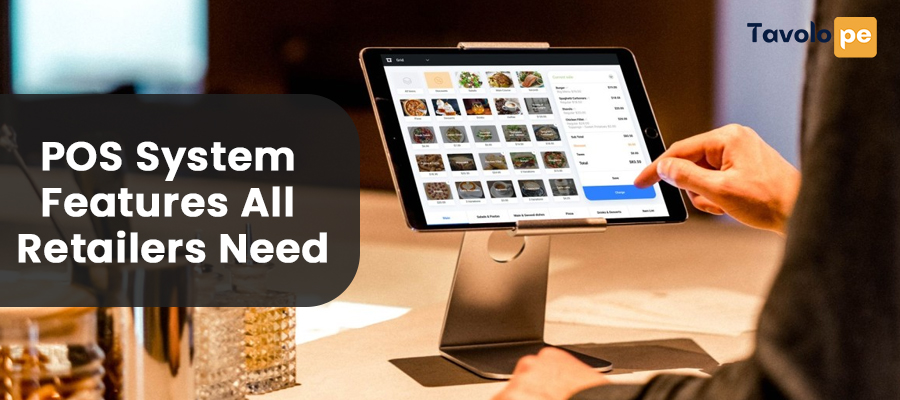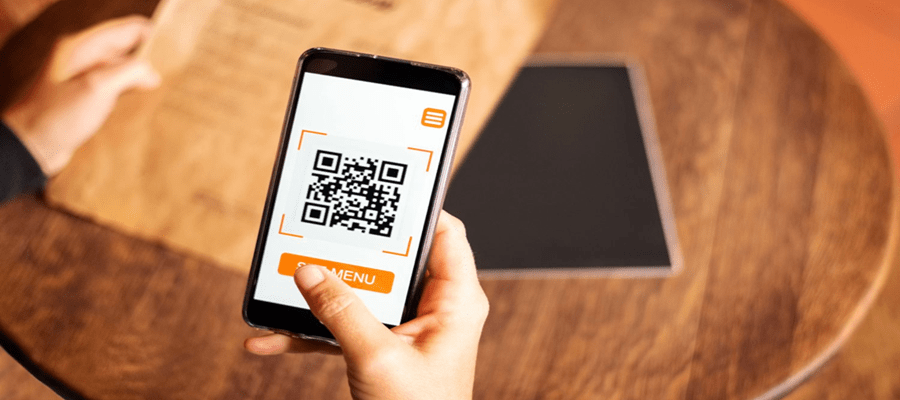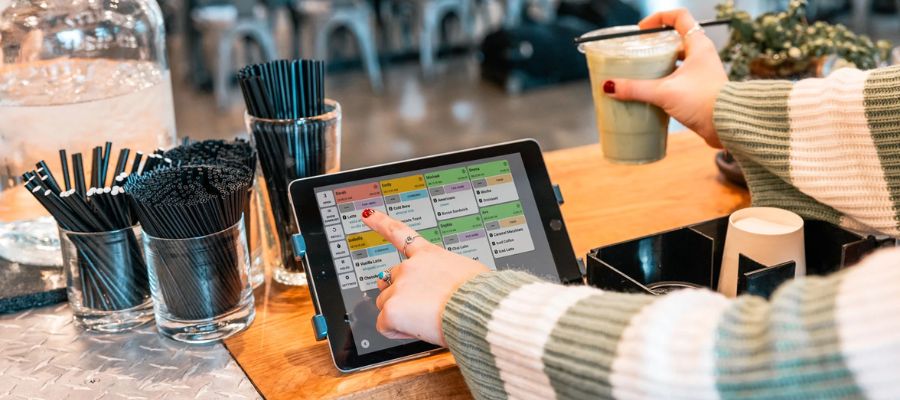
POS System features all Retailers Need
It is important to understand the various features of a POS system that every retailer should possess.
Choosing the right POS is very important if a retailer wants to meet its objectives for managing transactions, selling, controlling stock, analysing customer buying habits and generating reports. In light of all the available POS systems, it becomes almost challenging to just decide on the essentials that your business needs. Here, the author presents the POS system features list of some of the most important features that any retailer should consider when comparing the options.
In order to help meet the needs of a business, there are certain key features that should be sought out in a retail POS system.
As when developing your POS features and benefits check list don’t forget to consider the front end and back end functions. Sure, more eye-grabbing customer facing functionalities that depend on the POS may initially grab your attention but to get the most out of your POS you will need to settle for perfect inventory, reporting and analytical functionalities. Here are some key areas to assess:Here are some key areas to assess:
Intuitive Interface
Another major concern is maintaining an interface that is clear, simple and easy to understand, so as to avoid extended periods of training for the employees and also for the smooth running of the transactions. Search for POS systems that have minimal or none display to employees of some buttons and functions depending on their ranks. Another factor of concern is the interaction where people are looking for the touch screen or mobile access and usability.
Robust Payment Processing
It is quite self-explanatory that quick and effective payment processing is a critical factor in any retail POS systems. Seek for flexibility in the software and hardware you are using in processing the payments you are taking today and also those you may want to adopt in the future as you grow. You should also look out for features such as processing of EMV chip card, contactless payment like apple pay and mobile payments and ecommerce payment gateways for online stores.
Omnichannel Selling
Talking about ecommerce, the omnichannel retailing is now in vogue, thus, check if your POS is compatible with both offline, as well as online selling channels. Others such as inventory management and order management across the channels assist in avoiding stock-out situations without complicating processes.
Customer Relationship Management (CRM)
Knowing your customers and what they are buying critically shifts the capacity to deliver targeted services and plan business expansion. Recommended POS CRM includes customer profiles/buying behavior logging and targeted offers or reward programs. It also assists in accumulating marketing lists integrated at the email collection during the checkout process.
Detailed Reporting
Your POS software should also be designed with interactive sales reports and analytic dashboards that will give you full visibility of your business. Executive summary reports that detail the best selling products, sales by region, revenues by mode of payments, among others, help you to detect areas that need fixing and make necessary changes.
Mobile Access & Management
Some of the pos system features in restaurants have also shifted their focus towards mobile possibilities for managing the processes. Not only must your POS tender handle the transactions on tablets, smart phones or wireless terminals in a line buster type of fashion, but the administrative console must also be mobile enabled. This enables the managers and owners who form part of the back-end team to do inventory check, report analysis, schedule check among other vital activities even when they are outside the store.
Inventory Management Features
When talking of inventory control, you should also consider the increased and improved supply chain management and stock control tools. Your POS system needs to offer the following features so as to avoid a disruption of your business: Purchase order generation and tracking, low stock notifications, supplier lists, and inventory transfer processes. It is also important to note the ability to support serial numbers or barcodes for scanning and the ability to manage matrix inventory such as sizes and colors in clothing are critical to many retail segments.
Security
Since you are a payment card information and its owner’s own selling profit margin, security features of POS should be non-negotiable. Full card encryption, tokenisation and EMV capability help to safeguard against hackers and other breaches. Furthermore, there is no activity within the organization that cannot be controlled through role-based access restrictions and other highly specific permission settings.
Hardware Flexibility
When considering POS systems for retail, do not be hasty in your decision and consider which types would be ideal for your business in terms of infrastructure and devices. Although terminal based registers or mobile POS are concepts which can be integrated in standalone hardware packages there are also POS systems which are modular and allow the retailers to bring your own device (BYOD).
For instance, use of iPads and other tablet devices in consumption can be converted into stylish checkouts, yet they are affordable. Just make sure that your POS vendor is capable of integrating your POS hardware with certified third-party devices and offer technical support for any device that you incorporate into your POS system.
It is an open API to allow the integration and customization of third-party products.
It is vital to understand that there will never be a POS platform in the market today that will be able to meet all the unique business requirements without needing customization.
Focusing more on an open API means that your POS can easily connect with accounting software, loyalty platforms, other tools in the POS tech layer in your establishment. In this way, retailers can ‘map’ the dots and align them to provide a more coherent picture of data analyses, while also linking them to automation for efficiency in the processes. In evaluating the criteria for POS systems, this aspect is important because rapidly scaling businesses require flexibility, including the ability to be customized and extended.
Deciding POS: Right Choice Aimed for Success: An Example
For instance, consider iPad POS Square, which meets many of the criteria highlighted above such as mobile, cloud-based, social, real-time, and local. Square for Retail is designed to serve small shops with a single till and new micro-multiplier stores, as well as vast chains with many points of sale reaching hundreds of stores.
The Square POS platform is easy to use and user-friendly with well organized Menu and sub-menus depending on the user role. It is highly secure and effective in handling face-to-face payments, including chip card and contactless (NFC) payments, as well as safe online payments. With the help of omnichannel order management, all online, in-store, and curbside pickup sales channels are displayed in one interface.
It allows item library management, matrix inventory tracking, PO and stock count workflows using barcode scanning on the Square Dashboard. Some CRM characteristics involve customer records and purchase analysis for the development of other marketing tools such as loyalty schemes and email blast. Current employee management tools help in organization of staff, including their work schedules and remuneration especially in large organizations or across the enterprise. Over 20 Sales Reports’ templates provide real-time sales figures and summery, labour cost, payment gateways’ fees, and other financial figures.
For additional information, an open API also enables Square POS in the connection to numerous other retail business systems for accounting, foot traffic, staffing software, inventory, and other related technologies. Extensions also allow for such innovative elements in the retail domain such as self checkout stations. As an example of point of sales, Square offers relatively low cost of hardware, software licensing and payment processing fees, in addition to outstanding customer support – a perfect example of must-have functionality for an almost any retail business.
Key Takeaways
Establishing an efficient point of sale system that has front-end and back-end capabilities is a necessity if your retail business will be competitive today and in the future. Keep these vetted POS features and capabilities in mind as you evaluate different solutions:] Initiated in a similar fashion as the previous one, the present problem statement is derived from an article published in the Journal of Advanced Nursing, titled ‘Feasibility and outcome of a preoperative screening programme for frailty in elective surgical patients.’
-
Ease of adoption by staff together with the reception by customers.
-
Flexible payments support
-
Integrated order, inventory, and customer relationship management across the unified omnichannel.
-
The last role is advanced reporting and analytics, where analysis is performed not only on the operational and financial data of the company but also on the customer base.
-
The other factor that needs to cater for is the access across the devices specifically mobile and tablets.
-
These include security, encryption, and permissions management.
Even though Square POS is one of the more attractive options that is in line with many of these factors, do not limit your search only to mobile point of sale systems for retail, as it is the case with Square POS, as there is more to consider in the realm of POS solutions and systems for retail stores out there. By utilising the concepts of next-generation point of sale, the retailers are able to transform their operations into more efficient and effective means of processing, increase the personalisation of the customer experiences and open up new possibilities for the development of new solutions.


